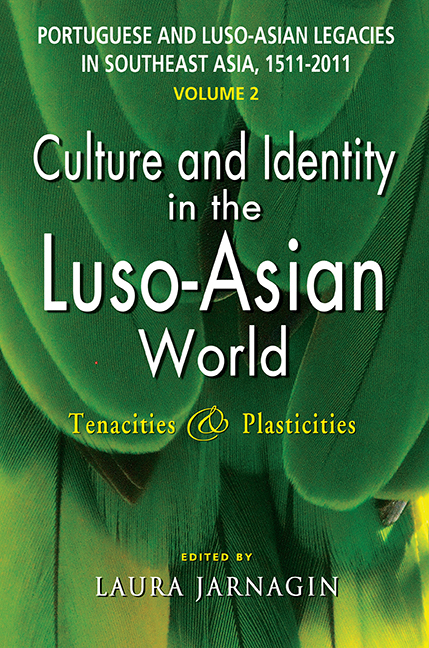 Portuguese and Luso-Asian Legacies in Southeast Asia, 1511-2011, vol. 2
Portuguese and Luso-Asian Legacies in Southeast Asia, 1511-2011, vol. 2 Book contents
- Frontmatter
- Contents
- List of Figures and Tables
- Preface
- List of Contributors
- Glossary
- Introduction: The Qualitative Properties of Cultures and Identities
- Part One Crafting Identity in the Luso-Asian World
- Part Two Cultural Components: Language, Architecture and Music
- 5 The Creole-Portuguese Language of Malacca: A Delicate Ecology
- 6 Oral Traditions of the Luso-Asian Communities: Local, Regional and Continental
- 7 Verb Markings in Makista: Continuity/Discontinuity and Accommodation
- 8 From European-Asian Conflict to Cultural Heritage: Identification of Portuguese and Spanish Forts on Ternate and Tidore Islands
- 9 The Influence of Portuguese Musical Culture in Southeast Asia in the Sixteenth and Seventeenth Centuries
- Part Three Adversity and Accommodation
- Appendix: Maps
- Bibliography
- Index
- Titles in the Nalanda-Sriwijaya Studies Centre Series
6 - Oral Traditions of the Luso-Asian Communities: Local, Regional and Continental
from Part Two - Cultural Components: Language, Architecture and Music
Published online by Cambridge University Press: 21 October 2015
- Frontmatter
- Contents
- List of Figures and Tables
- Preface
- List of Contributors
- Glossary
- Introduction: The Qualitative Properties of Cultures and Identities
- Part One Crafting Identity in the Luso-Asian World
- Part Two Cultural Components: Language, Architecture and Music
- 5 The Creole-Portuguese Language of Malacca: A Delicate Ecology
- 6 Oral Traditions of the Luso-Asian Communities: Local, Regional and Continental
- 7 Verb Markings in Makista: Continuity/Discontinuity and Accommodation
- 8 From European-Asian Conflict to Cultural Heritage: Identification of Portuguese and Spanish Forts on Ternate and Tidore Islands
- 9 The Influence of Portuguese Musical Culture in Southeast Asia in the Sixteenth and Seventeenth Centuries
- Part Three Adversity and Accommodation
- Appendix: Maps
- Bibliography
- Index
- Titles in the Nalanda-Sriwijaya Studies Centre Series
Summary
To this day, instrumental music and singing still play a prominent role in social events among the Luso-Asian communities, be it at religious services, processions and feasts, weddings, receptions, or whenever the occasion calls for a display of the community's cultural heritage. This is also true of the Indo-Portuguese communities, for which we have considerably numerous records of oral traditions, including songs, riddles, prayers, stories, sayings and the like. Among the various such collections, the richest concern the communities of Sri Lanka, a body of literature studied in-depth by Jackson and Jayasurya. In this chapter, the point of departure will be an analysis of the relatively understudied song repertoire of the Indo-Portuguese communities of the former Província do Norte (comprising the cities of Bassein, Bombay, Chaul, Daman, and Diu). My aim is to characterize this corpus in formal terms, in the light of our present knowledge of the languages spoken by the Norteiros, and uncover some thematic links it establishes with other repertoires collected elsewhere.
The oldest records of Norteiro songs we have access to are found in the late nineteenth-century writings of Schuchardt. Later published sources include Dalgado, Quadros, Moniz, and scattered contributions to periodicals such as the bulletin O Oriente Português, Revista da Academia da Língua e Cultura Portuguesa or Ta-Ssi-Yang-Kuo. Recent fieldwork data, collected by members of the communities and researchers alike in Diu, Daman and Korlai, also complements whatever material can be gathered from these written sources.
Issues of a linguistic nature are particularly important due to the fact that Portuguese-lexified creole languages formed among all of the Norteiro communities (see the second section of this chapter, “The Norteiros and Their Language”), as they did in many other Luso-Asian communities across the continent. Yet, to be precise, our corpus does not constitute a “creole song repertoire”. It is, as a matter of fact, linguistically very heterogeneous, with registers spanning from the most basilectal creole to the most metropolitan Portuguese.
- Type
- Chapter
- Information
- Portuguese and Luso-Asian Legacies in Southeast Asia, 1511-2011, vol. 2Culture and Identity in the Luso-Asian World: Tenacities & Plasticities, pp. 143 - 166Publisher: ISEAS–Yusof Ishak InstitutePrint publication year: 2012


